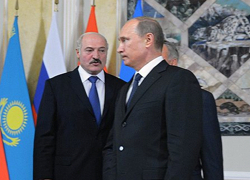“Union makers” facing hard year
27- 3.01.2014, 12:58
- 22,723

At the start of a new economic and political year experts see increased bargaining and procrastination with signing the Eurasian Economic Union agreement.
An international observer Andrej Fiodarau in his comment to BelaPAN noted that it could be easily assumed that the trends of the late 2013 will remain and may even intensify. “They started intensely speaking of the idea of five Belarusian enterprises to be given to Russia. The fact that two billion dollars were promised is linked to that”, - the political scientist points out.
In his opinion, Russia will try “to neatly get all the economic assets here that they set their eyes on, without too much hassle, forcing the Belarusian authorities to do that; first these five, then some other – there are enough leverages of influence”.
“In the same way the official Minsk will be forced to sign the agreement on the Eurasian Economic Union, although we know that there are still much ambiguity and many contradictions. In my opinion, the tendency of gradual forced involvement into the orbit of Russia’s influence will remain”, - Fiodarau is convinced.
At the same time the expert notes that it is yet too early to speak of new members joining the Eurasian Union in 2014.
“Only the Customs Union may expand or the Single Economic Area, although there are problems there as well. I think, despite all the resistance on the part of Belarus and Kazakhstan, the negotiations will formally move forward”, - the interlocutor is convinced.
The political scientist sees it as obvious that neither Astana, nor Minsk want a political supranational union, because they understand that Moscow will dominate there.
“They will be resistant. But while Astana has some resources for that, then the official Minsk does not have so much, considering that on the other side (on the side of the EU - BelaPAN) it does not have support: it actually put itself in such a position, when remained one on one with Moscow”, - Fiodarau pointed out.
In the opinion of an economist Siarhiej Chaly, Belarus will face several “decisive deadlines” in 2014:
“This is the end of the I quarter and the middle of the year, when the term of our government’s promises will be expiring to implement these five integration projects. By the end of the year the signed oil balance will expire too”.
Apart from that, Chaly added, by May the document will have to be prepared on the Eurasian Economic Union.
“There are enough problems with those too. For what I understand, they have so far managed to only come up with its organizational and legal structures and mechanisms, but as for the content there are serious questions there. What would the Belarusian party want to see there is so far the most radical approach. I mean the elimination of all limitations and exemptions that exist in the free trade regime”, - Chaly pointed out.
The economist does not rule out that the two billion of the promised Russian loan were meant as the support until the moment when Minsk will have to make decision on all the problematic issues. “Before the middle of the year everything will look pretty cloudless and constructive, and then if not problems will start, then a tug-of-war on the five projects and the EEU agreement”, - Chaly predicts.
At the same time he does not believe that the agreement will be signed by May 2014 as scheduled:
“We can see that there is a difference precisely in the approaches, not in some technical issues. This reminds of the situation of the creation of the Customs Union. Then there too was a long period of ratification-non-ratification, “God Father” documentaries, they almost twisted the arms for ratification to take place.
But then it all only started, and for the Eurasian Union it is impossible to come up with anything else. This is the final stage of the integration, beyond which problems can no longer be postponed. The previous approach was like that: if there are some problems with the Customs Union – we will solve them with the Single Economic Area, there are problems with the SEA – let’s take them to a higher level. Now this will not work. I predict serious argument on that topic”, - the expert concludes.










